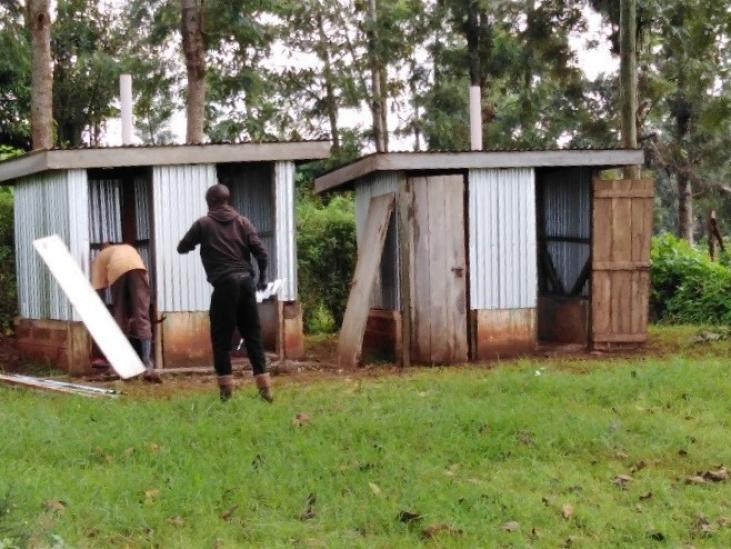Despite official plans many of Kenya’s public healthcare facilities lack basic water, sanitation and hygiene (WASH) services particularly for persons with a disability.
Published on: 02/12/2019
This blog is written by Christine Ajulu, Project Officer at HERAF, Kenya
The Kenya government has meant to bring a standard of health services to the country through the 2005-2010 National Health Sector Strategic Plan and the subsequent Health Sector Strategic and Investment Plan 2013-2017. Outlined within these national strategies is Kenya’s Essential Package of Health Services (EPHS), which is the basic health service a government is, or aspires to, provide all citizens in an equitable manner. In 2009, dimension 4 of the EPHS has proposed proper programmes for sanitation in healthcare facilities (HCF). Despite these official plans many of Kenya’s HCFs lack basic water, sanitation and hygiene (WASH) services, such as adequate and constant supply of safe drinking water, handwashing stations for healthcare professionals and patients, clean gender and disability friendly toilets, waste disposal bins and incinerators.
To address these ongoing disparities Health Rights Advocacy Forum (HERAF) is bringing in their extensive advocacy experience to improve WASH conditions in Kenya’s Nyeri and Isiolo Counties public HCFs with a grant from IRC. They began meeting with local government officials, healthcare professionals, and community members. The topic of WASH in HCFs caught most attendees by surprise because they had not been part of deliberations on these policies and public investment decisions.
During the meetings, local residents and healthcare professionals shared their accounts with local government officials to illustrate the issues. Community members identified a lack of WASH facilities as contributing to people shying away from local public HCFs, which negatively affects access to and delivery of healthcare. The meetings uncovered the lack of comprehensive policies, inadequate county health facilities investment plans, budgets and political goodwill towards providing WASH in HCF. Often there was only one member of staff or a volunteer in charge of these services who was not properly trained or paid regularly, and typically lacked the basic personal protective equipment to perform their duties.
HERAF mobilised other community service organisations (CSOs) to reach out to county government planning and budget officials to prioritise WASH in HCFs. Officials were asked to establish budget lines for WASH in HCFs and allocate funds for each of the county healthcare facilities in the 2019/2020 financial year budget. The CSOs consulted with government officials to understand how decisions for WASH in HCFs were made, how much budget was allocated, spent and what could be done to improve policy implementation and expenditure.
A petition was developed and submitted for consideration to the office of the County Executive Committee (CEC) Member for Finance and to the County Assembly, through the Budget and Appropriation Committee. It is hoped these efforts will help in improving the investment for WASH in HCFs and subsequently encourage more citizens to access healthcare services from public healthcare facilities.

Despite continued infrastructural development and improved access to quality health services, persons with disabilities (PWDs) continue to face challenges in accessing full spectrum WASH services. A person confined to a wheelchair must overcome the obstacle of travelling long distances to seek services, often on a motorbike taxi, and the long queues that characterise public health facilities, so to arrive at the HCF and find no accessible toilet facility adds agony to the already challenging experience.
Explaining this impediment to medical care in rural HCF, one woman told HERAF employees, “I brought a relative to the hospital who was requested to present urine samples for laboratory tests. Attempts to use the only available patient’s toilet proved futile. Despite navigating the challenging terrain towards the toilet, the small toilet space could not accommodate the wheelchair. I had to take her to the nearby bush to get these samples thereby lowering her dignity in attempt to enjoy the right to health.”
Her sentiments were echoed by a health care worker who pointed out that “Indeed I have never thought about how a person in a wheelchair goes about to collect stool or urine samples for diagnostic testing in our laboratory. As clinicians we are quick to request for samples without giving it a thought”.
It is not uncommon for persons with disabilities to forego hospital visits in preference of self-medication because of the lack of rights-based planning at HCFs, including WASH access. Little or no attention is given to the less fortunate in seeking their views in decisions. They are almost always an afterthought.
“All along our health facilities toilets were put up with abled persons in mind. The issue of disability friendly WASH services was alien for a long time. We must now plan and budget with PWD in mind”, said a chair of a rural health facility management committee.
Targeted sensitisation of communities on the need for both proper and disability accessible WASH facilities is important in informing community actions in advocacy. This understanding can be translated into creating or renovating WASH facilities to ensure they are friendly to PWD, ensuring each HCF has dedicated staff to maintain facilities. As a result of HERAF’s advocacy efforts, one health facility in Nyeri County will start renovating all the toilets to ensure that they are safe and accessible to all clients.
At IRC we have strong opinions and we value honest and frank discussion, so you won't be surprised to hear that not all the opinions on this site represent our official policy.